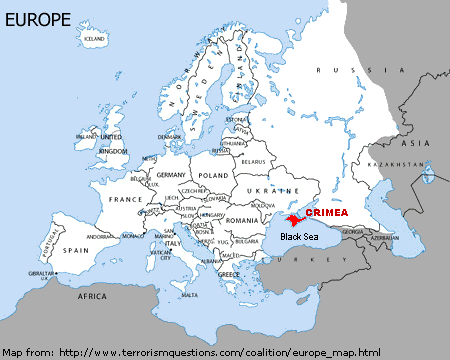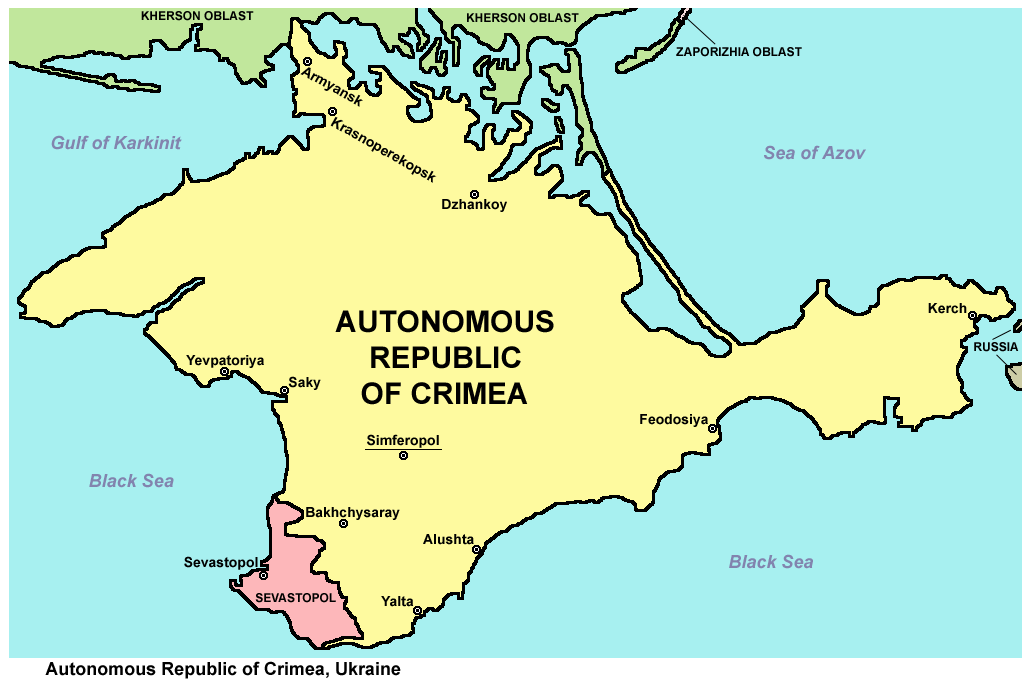Now i know that many of you may not especially care about the Crimean Peninsula, especially given that it is in no way connected to the United States. In fact it lies half way around the world in a rather choice location on the Black Sea.
Crimea has had a troubled history and much like Ukraine has often been invaded and occupied by different powers, including Gothic tribes, the Kievan Rus' state, the Mongols and the Byzantine Empire. Crimea was obviously a pretty coveted little peninsula, and rightly so. Because of its location, Crimea provides an occupying government with a very strategic location and an ability to regulate trade between the Black Sea and the Sea of Azov.
And it is because of this strategic location that the great powers of Russia and an alliance of the Ottoman Empire, France, Britain and Sardinia (Taylor) went to war over it in 1853. The war lasted for 3 years and was devastating to all sides. In the end Russia lost the war to the alliance, however it retained the badly battered Crimean Peninsula.
Moving into the 20th century, Crimea was briefly its own sovereign state in 1917 after the fall of the Russian empire. It was quickly drawn back under the sphere of Russian control though as the Russians experienced their civil war. After the formation of the USSR in 1921, Crimea was known as the Crimean Autonomous Soviet Socialist Republic, and then later became the Crimean Oblast, an administrative region of Russia, in 1945.
During WWII it was occupied by Nazi Germany, and when it came back under Red Army control after the turn on the eastern front, "it forcibly deported the entire population of Crimean Tartars to Central Asia as punishment for collaboration with German forces"(Taylor).
Then in 1954 Premier Nikita Khrushchev made a gift of the peninsula to Ukraine.
In 1991, Despite Crimean desire to become its own sovereign state, Crimea and Ukraine agreed to keep the Crimean peninsula a part of Ukraine but give Crimea its own constitution and legislation.
So how does this history play into the current issues in Ukraine and Crimea today? Well.... there are a lot of Russians in Crimea. And Russians tend to like Russia.
With the recent political activity in Ukraine, and the currently sort of confusing government thing that is going on over there (which i will not go into in this post) there has been a lot of activity surrounding Crimea. And this is where the US comes in.
Admittedly, if you have heard anything about the recent feelings of Russia surrounding the ownership of the Crimean Peninsula I'm sure you have probably heard something that sounds a little bit shady. However Russia claims that there is nothing shady about the recent addition of the Crimean Peninsula into the Russian state.
President Vladmir Putin of Russia signed a treaty with the Crimean Prime Minister Serhiy Aksyonov after a resounding 96 percent of Crimean people voted in favor of becoming part of Russia (Putin Claims...). Putin says "Crimeans say that in 1991, they were passed to Ukraine like a sack of potatoes. It is hard to disagree with that. Since then many people have raised the issue - and have said that Crimea is a Russian land, and Sevastopol is a Russian territory" (Putin Claims...). And that while it is true that the turnover of Crimea went against international law it was done as a response to the will of the people who voted in a referendum that was "in full accordance to the democracy standards and international law" (Putin Claims...).
The US disagrees with Putin's assessment of the situation saying that Russian annexation of the Crimean Peninsula is "nothing more than a land grab" (Vice President Joe Biden in Press). However Putin stated that these accusations and pressures from the west are merely an example of their notoriety for double standards, saying that "it's good that they at least remember that international law exists" (Press). Putin says that Western nations are denouncing the actions of Russia as a land grab and as "a threat to the civilized world and international security" (Press), but at the same time many of these western nations have trampled upon international norms in the wars in "Serbia, Iraq, Afghanistan and Libya" (Press).
And i think that President Putin has a very reasonable point. Too often the United States creates laws and sanctions for international conduct and then expects everyone but themselves to adhere to those laws. As Putin so aptly says it "Our Western partners led by the United States prefer to proceed not from international law, but the law of might in their practical policies" (Press). So perhaps the US should not be so quick to puff out its chest and denounce Russian actions, especially when its record for recent international conduct is not so very clean either.
If you want to learn more here is a great video which talks about the current issues in Crimea but focuses a little more on the issues in Ukraine.
https://www.youtube.com/watch?v=A2nklduvThs
Press, The Associated. "Putin Signs Treaty To Add Crimea To Map Of Russia." NPR. NPR, n.d. Web. 18 Mar. 2014. <http://www.npr.org/templates/story/story.php?storyId=291017632>.
"Putin Claims Ukraine's Crimea as Russian Territory to Right Historical Wrong."KyivPost. N.p., n.d. Web. 18 Mar. 2014. <https://www.kyivpost.com/content/ukraine/putin-justifies-russian-annexation-of-ukraines-crimea-339815.html>.
Taylor, Adam. "To Understand Crimea, Take a Look Back at Its Complicated History."The Washington Post. N.p., n.d. Web. 18 Mar. 2014. <http%3A%2F%2Fwww.washingtonpost.com%2Fblogs%2Fworldviews%2Fwp%2F2014%2F02%2F27%2Fto-understand-crimea-take-a-look-back-at-its-complicated-history%2F>.



Cool post, Emma. I agree that America has a tendency towards double standards, and it's particularly clear in this situation. We as a country do not have much business denouncing the actions of others, and the media especially is not acting very rational about the situation. John Green's videos are always insightful and do a good job of explaining the circumstance, I'm glad you included this one. His video on the American Dream is also pretty relevant: https://www.youtube.com/watch?v=iYGc8-L_NmE.
ReplyDelete